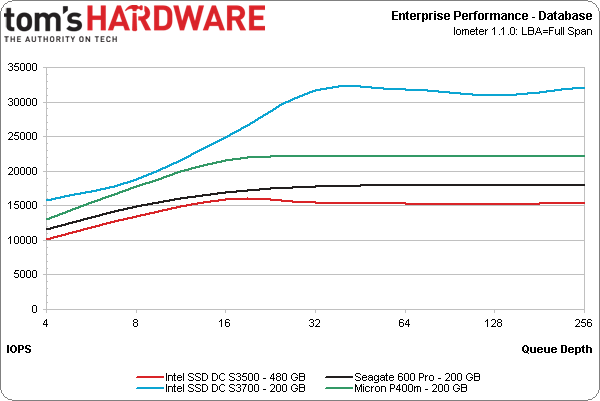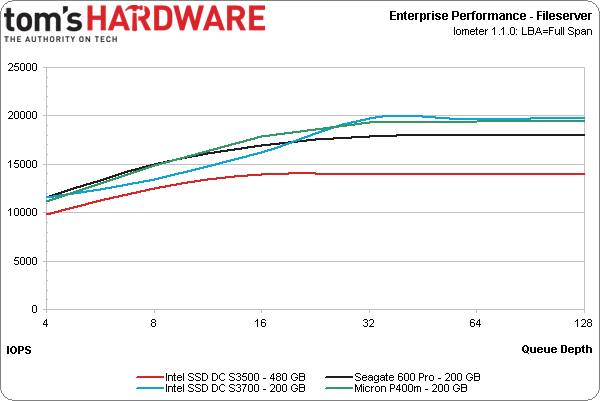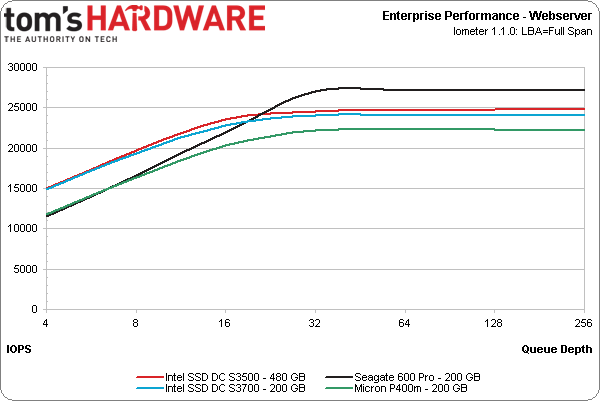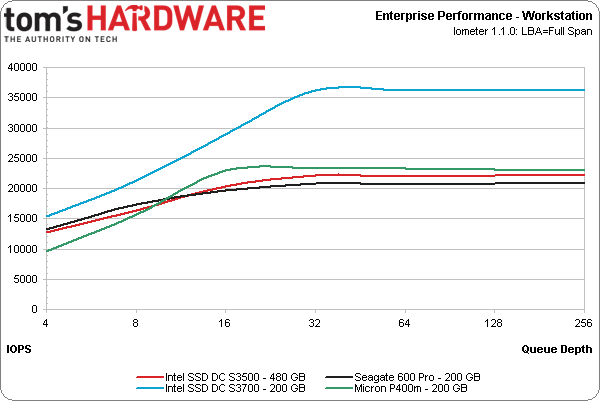The SSD DC S3500 Review: Intel's 6 Gb/s Controller And 20 nm NAND
As enterprise SSDs become more specialized and application-focused, Intel is hoping its SSD DC S3500 will strike a chord with customers looking for excellent read performance on a budget. We compare this drive to other notable contenders in its class.
Results: Enterprise Workload Performance
Our next set of tests simulates different enterprise-oriented workloads, including database, file server, Web server, and workstation configurations.
The database workload (also categorized as transaction processing) involves purely random I/O. Its profile consists of 67% reads and 33% writes using 8 KB transfers.
Compared to our random performance benchmarks a couple of pages back, the SSD DC S3500 comes a lot closer to Seagate's 600 Pro. But it's clearly the slowest drive on our list still.
In the file server workload, which consists of 80% random reads of varying transfer sizes, Intel's latest trails the other SSDs by a fairly wide margin.
The Web server workload (100% read, varying transfer size) doesn't do much to differentiate these enterprise-class SSDs. Both Intel drives yield nearly identical performance, but also trail the 600 Pro.
The workstation benchmark (80% reads, 80% random), proves no match for the SSD DC S3700, while the S3500 and 600 Pro are more evenly matched. Intel's S3500 actually pulls out a rare win against the 600 Pro.
Get Tom's Hardware's best news and in-depth reviews, straight to your inbox.
Current page: Results: Enterprise Workload Performance
Prev Page Results: Performance Consistency Next Page Results: Sequential Performance-
Mastle Hi, Think there's an error on page 1, $579 for 80GB drive......Surely won't be getting it at that price for my home build!Reply -
busuan Found myself suddenly losing interests in SATA SSDs after seeing the specs of PCIe SSD in the latest MBA refresh.Reply -
PapaCrazy An Intel 320 series SSD I put in my dad's computer just encountered the 8mb bug even though the firmware was updated with the "fixed" version. He uses the computer for business and I got him an Intel SSD thinking it'd be reliable. I think I'm gonna try Samsung next time around.Reply -
Evolution2001 Nitpicking here... but the article text is still wrong...or the math is. :pReply
''...we do know that the 800 GB model we're reviewing should run around $579. At ~$1.20/GB, ...''
800GB @ $1.20 = $960. -
drewriley Reply10952175 said:Nitpicking here... but the article text is still wrong...or the math is. :p
''...we do know that the 800 GB model we're reviewing should run around $579. At ~$1.20/GB, ...''
800GB @ $1.20 = $960.
Thanks, just can't seem to get the right combination of 4, 8 and 0. The 480GB version is $579 -
drewriley Reply10952165 said:An Intel 320 series SSD I put in my dad's computer just encountered the 8mb bug even though the firmware was updated with the "fixed" version. He uses the computer for business and I got him an Intel SSD thinking it'd be reliable. I think I'm gonna try Samsung next time around.
With the BAD_CTX_13X (8MB) failure, the fixed firmware fixed 'most' of them. The failure rates are quite low, especially after the FW 'fix', but if that one failure happens on the only drive you bought, it can really suck. As a consumer, I could care less if a million other people got a good SSD, if mine fails, I am upset. As an enterprise buyer, if one fails out a million, my company is throwing a party!
-
flong777 Why does Intel continue to release mediocre SSDs? Granted this performs middle of the pack but I just don't understand why a company with Intel's resources doesn't put out a top performer like the 840 Pro.Reply -
Grizely1 Reply10955531 said:Why does Intel continue to release mediocre SSDs? Granted this performs middle of the pack but I just don't understand why a company with Intel's resources doesn't put out a top performer like the 840 Pro.
Go back and read the article.
Or, learn the difference between consumer vs commercial. It's a DT (Data Center). -
flong777 Reply10959572 said:10955531 said:Why does Intel continue to release mediocre SSDs? Granted this performs middle of the pack but I just don't understand why a company with Intel's resources doesn't put out a top performer like the 840 Pro.
Go back and read the article.
Or, learn the difference between consumer vs commercial. It's a DT (Data Center).
Fair enough, I guess I should have been more clear. I don't understand why Intel is involved with so many mediocre SSDs - whether enterprise or consumer.
While I am not an enterprise user, I think I understand the basics. Enterprise SSDs are geared to handle heavy cues and write loads.
You have a point that it is not fair to compare enterprise with consumer - they are two different animals.



